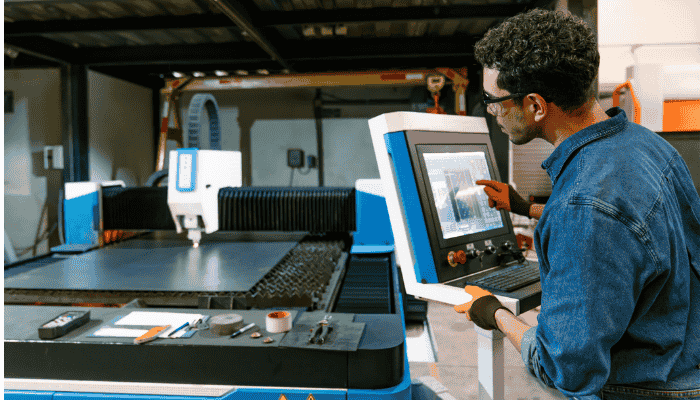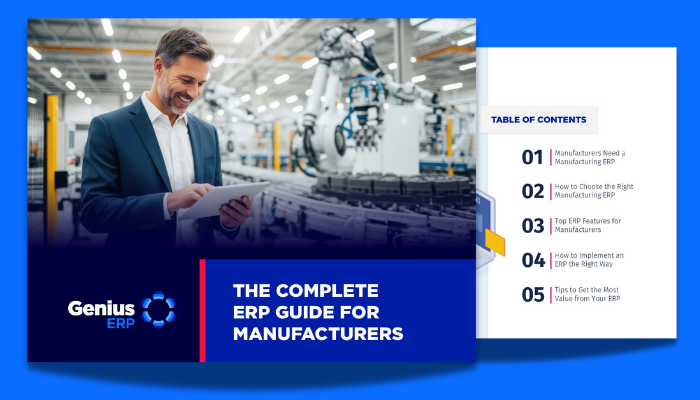
In the intricate world of manufacturing, there are many different ways that a product can be built. Each approach caters to unique business demands, and requires a distinct setup and different processes to complete the job. But, no mater the type of manufacturer you are — whether you are an ETO, CTO, MTO, MTS or contract manufacturer — you must streamline your operations, maximize efficiency, lower operating expenses and make better decisions to drive your business forward.
The one thing that helps all of these different types of manufacturers achieve results: An ERP system. No matter the type of manufacturing you do, an ERP is the best way to boost productivity in your shop.
ERPs improve your operations by combining your data and processes into one system and give you an integrated tool to help you optimize resources and enhance decision-making. ERPs, for a start, assist your business in streamlining financial processes, managing schedules, reducing errors, simplifying production planning, ensuring timely communication and collaboration throughout your organization, and so much more.
Engineer-to-Order (ETO) Manufacturing
Engineer-to-Order (ETO) manufacturing is synonymous with customization. In this type of manufacturing, products are designed and engineered according to individual customer specifications. Whether it’s a complex industrial machine or a precisely-engineered component, ETO manufacturers craft unique solutions. Each project kicks off with a blank canvas, demanding intricate design, engineering and planning. As a result, lead times can be lengthy, costs higher and supply chain complexity intensified.
An ERP system is essential as it integrates data from various departments, enabling seamless collaboration between design, production and procurement. An ERP also accelerates communication, expedites design iterations and ensures timely material sourcing, making it easier for ETO manufacturers to meet customer expectations for quality and delivery.
Configure-to-Order (CTO) Manufacturing
Configure-to-Order (CTO) manufacturing strikes a balance between customization and efficiency. Manufacturers offer a selection of pre-configured options that customers can choose from to create a tailored product. This approach reduces lead times compared to ETO, as manufacturers work within predefined configurations and components.
ERPs help in CTO scenarios by managing product configurations, optimizing inventory levels and generating accurate bills of materials based on selected options. This streamlines production, ensuring that customized products are assembled swiftly and accurately.
Make-to-Order (MTO) Manufacturing
Make-to-Order (MTO) manufacturing is about producing products as soon as an order is received. Unlike ETO, MTO manufacturers rely on standardized designs but still only initiate production once an order is confirmed. This approach ensures alignment with market demands and minimizes excess inventory.
An ERP system is vital for MTO operations, coordinating production schedules, procuring necessary materials and tracking orders from inception to delivery. An ERP helps MTO manufacturers to be more agile, avoid overproduction and maximize resource utilization.
Make-to-Stock (MTS) Manufacturing
Make-to-Stock (MTS) manufacturing centers on producing goods based on forecasted demand to build inventory in advance. This strategy suits products with consistent demand patterns and shorter lead times.
ERPs provide real-time insights into inventory levels, sales trends and demand forecasting, enabling MTS manufacturers to strike a balance between maintaining the right inventory level and avoiding overstocking. This data-driven approach helps prevent stockouts while minimizing holding costs.
Contract Manufacturing
Contract manufacturing refers to a business arrangement where one company, the contract manufacturer, produces goods or components on behalf of another company. Contract manufacturing jobs can range from producing simple components to assembling complex products.
ERPs foster collaboration between the client and contract manufacturers by integrating processes and data, which ensures that product specifications, quality standards and delivery expectations are met seamlessly. ERPs also help contract manufacturers manage multiple orders, letting them efficiently process orders, track their status and address changes.
The Crucial Role of an ERP System
No matter the type of manufacturing you do, an ERP system should be the foundation that your operations are built on, to streamline your processes, enhance visibility and enables data-driven decision-making. From managing intricate design processes in ETO, optimizing configurations in CTO, aligning production in MTO, overseeing inventory in MTS, to providing real-time updates on production progress in contract manufacturing — ERPs ensure efficiency, improve productivity and reduce costs.
Understanding the nuances of these different types of manufacturing allows us to help you align your operations with your business goals. Over the coming weeks, we will take you through a detailed look at our Virtual Tour of a manufacturing shop to show you how Genius ERP — built by and for manufacturing experts — has the features you need, whether you are an ETO or contract manufacturer, to get the job done right.
Get your eBook Scared to implement a new ERP?
"*" indicates required fields



